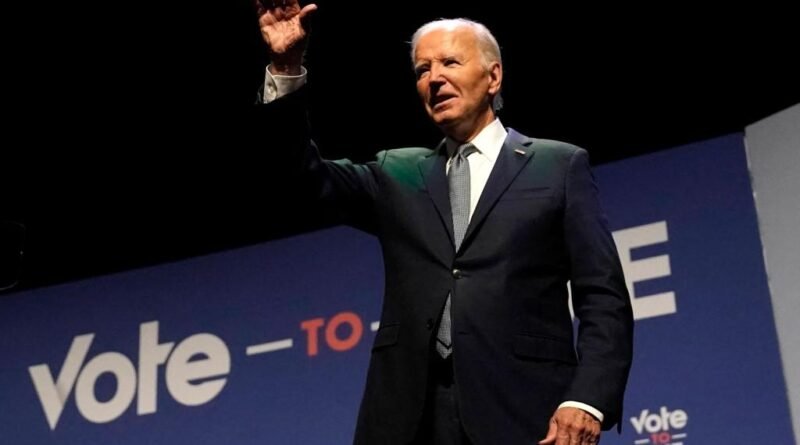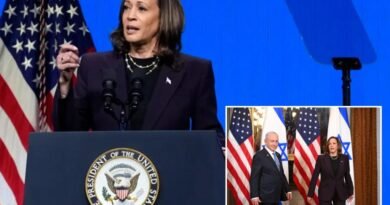Energetic Efforts to Rescue Old Joe, Biden’s ‘Confused’ Conciliation and Other Perspectives

Frantic Bids To Save Old Joe
“There is something almost comical about the frantic effort to ensure the Democratic Party nominates Biden as soon as possible,” criticizes National Review’s Jim Geraghty of “plans to hold a virtual roll call” ahead of the Aug. 19 convention.
After Biden’s poor debate performance and “flailing interviews with George Stephanopoulos and Lester Holt,” it’s “a sterling example of rewarding failure.”
They’d have us believe there’s a “sharper, more energetic, clearer-speaking Joe Biden hiding behind the curtain waiting to emerge,” when he’s plainly “losing his ability to communicate, and still looks old and doddering.”
He “mumbles a lot, offers thought and sentence fragments, and apparently can’t read off the teleprompter as well as he used to.”
Biden’s ‘Incoherent’ Appeasement
President Biden’s top goal — to “avoid inflaming” the Mideast — prompts Joshua Muravchik at The Wall Street Journal to ask: Is Biden “capable of thinking clearly” about US interests?
After all, “authoritarians perceive such timidity as appeasement”; Israel is facing “perhaps its most perilous moment since its 1948 War of Independence,” particularly from Iran, and hanging it “out to dry” would be “disastrous for U.S. interests.”
So how does Biden “envision blocking Iran? With military action? Without inflaming the Middle East?”
Can the prez “square his ‘ironclad’ commitment to Israel with his threats to withdraw US support if the Jewish state defends itself in ways with which he disagrees?”
None of it “makes sense.” Fact is, Biden’s “behavior betrays an incoherent — and self-serving — approach to global affairs.”
Vance as Religious Populist
“Something important has changed in the way religious Americans approach politics” — “a growing sense of alienation,” notes Matthew Schmitz at First Things.
“To understand the reasons for this transformation, I sat down with JD Vance.” Vance’s populism stems in large part from “his understanding of Christian politics” on everything from marriage to worker protections to tax policy.
This “has come to the fore because religious believers are increasingly excluded from important institutions,” especially when elites increasingly see “anyone who dissents from progressive ideas” as an enemy of the nation itself.
As long as that remains true, if believers “want to exercise the duties of citizenship rather than withdrawing from politics altogether, they will need to look to leaders like JD Vance.”
A ‘Normie’ GOP Convention?
The mood at the RNC “is far from the Nuremberg-style hatefest I’d, frankly, expected,” marvels The Nation’s D.D. Guttenplan.
Some still “seemed determined to live up — or down — to the label of ‘the nasty party,’ ” but “the theme overall was of reconciliation, not revenge, and of restoration, not revolution.”
The very first delegate he met “told me she had come to the convention ‘to talk about the things that unite us as Americans, not the things that divide us.’ ”
Tuesday, Marco Rubio, “fresh off of losing to [J.D.] Vance in this year’s veepstakes” delivered an effective “tribute to Corey Comperatore, the former firefighter killed at the Trump rally on Sunday, which depicted the party’s credo of ‘America First’ not as a jingoistic rallying cry but as ‘a fight for the hopes and dreams that unite us, and make us one.’ ”
Reduce the Heat With Federalism
With our deep political divisions, maybe the “temperature can be turned down by making contests less important,” argues Reason’s J.D. Tuccille.
“If the federal government had a smaller role in our lives, it wouldn’t matter so much who wins control of the White House and Congress.”
That’s old-fashioned “federalism, of course — a principle on which the structure of the United States was based.”
Republicans are already signaling a shift toward a federalist approach, and Democrats too “briefly rediscovered an interest in federalism when Trump was in the White House and may again with him poised to return.”
Enabling voters to enjoy their preferred policies “locally” is a far better alternative to “national conflict and violence.”
— Compiled by The Post Editorial Board



